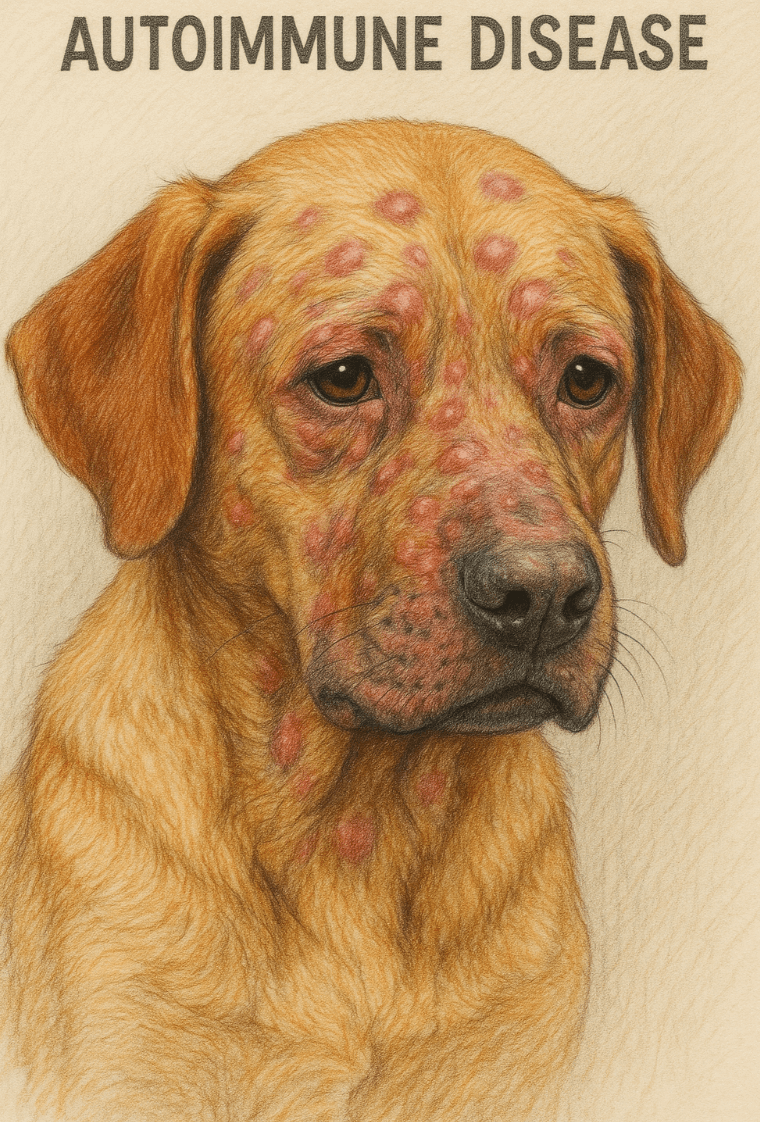Autoimmune Disease in Dogs: Understanding the Silent Threat
Autoimmune diseases in dogs are complex and often misunderstood conditions where the immune system mistakenly attacks the body’s own cells. These disorders can affect various parts of a dog’s body, from their skin and joints to vital organs like the kidneys and liver. While autoimmune diseases are relatively rare, they pose significant challenges for both dogs and their owners. Early detection and proper management are crucial to ensuring a good quality of life for affected pets.
In this blog post, we’ll explore what autoimmune diseases are, common types, symptoms to watch for, and how to support your dog through diagnosis and treatment. Whether you’re a concerned pet parent or simply curious about canine health, this guide will provide valuable insights into managing autoimmune disease in dogs.
Common Types of Autoimmune Diseases in Dogs
Autoimmune diseases can manifest in different ways, depending on which part of the body is affected. Here are some of the most frequently diagnosed autoimmune conditions in dogs.
Immune-Mediated Hemolytic Anemia (IMHA):
This condition occurs when the immune system attacks red blood cells, leading to anemia and symptoms like lethargy and pale gums.Immune-Mediated Thrombocytopenia (ITP):
ITP involves the destruction of platelets, resulting in abnormal bleeding, bruising, or nosebleeds.Lupus (Systemic Lupus Erythematosus):
Lupus affects multiple organs and systems, causing symptoms such as skin lesions, joint pain, and fever.Pemphigus Complex:
A group of skin diseases where the immune system targets skin cells, leading to blisters, crusts, and sores.Polyarthritis:
This condition causes inflammation in multiple joints, resulting in lameness, swelling, and discomfort.
Understanding these types of autoimmune diseases helps veterinarians and pet owners identify potential issues early and provide targeted care.
Signs and Symptoms of Autoimmune Disease in Dogs
Recognizing the signs of autoimmune disease is critical for early intervention. Since symptoms can vary widely, it’s important to be vigilant and consult a vet if something seems off.
Unexplained Lethargy:
Sudden or persistent fatigue may indicate an underlying immune-related issue.Skin Lesions or Hair Loss:
Patchy fur, scabs, or sores on the skin can signal autoimmune skin conditions like pemphigus.Joint Swelling or Lameness:
Dogs with polyarthritis may exhibit stiffness, limping, or reluctance to move.Pale Gums or Jaundice:
Discoloration of the gums could point to IMHA or liver involvement.Frequent Infections or Slow Healing:
A compromised immune system may struggle to fight off infections or heal wounds properly.
Being aware of these symptoms allows pet owners to seek veterinary care promptly, improving outcomes for dogs with autoimmune diseases.
Check this guide 👉Mastitis in Dogs: Best 7 Expert Tips!
Check this guide 👉Staph Infection in Dogs: Best 7 Expert Tips!
Check this guide 👉Corneal Dystrophy in Dogs: Best 7 Expert Tips!

Diagnosis Tools for Autoimmune Disease | Treatment Options Available |
|---|---|
Blood tests (CBC, biochemistry panel) | Immunosuppressive medications (e.g., steroids) |
Urinalysis | Antibiotics to manage secondary infections |
Biopsy of affected tissues | Plasma transfusions for severe cases |
Imaging (X-rays, ultrasounds) | Pain management and anti-inflammatory drugs |
Serological testing for specific markers | Dietary adjustments and supplements |
How to Support Your Dog with Autoimmune Disease
Managing autoimmune disease in dogs requires a holistic approach that combines medical treatment with lifestyle adjustments. Here are some ways you can support your furry friend.
Follow Veterinary Guidance:
Work closely with your vet to monitor your dog’s condition and adjust treatments as needed.Provide a Balanced Diet:
High-quality nutrition supports overall health and strengthens the immune system.Minimize Stress:
Stress can exacerbate autoimmune symptoms; create a calm and predictable environment for your dog.Regular Vet Check-Ups:
Frequent monitoring ensures any changes in your dog’s condition are addressed promptly.Monitor Medication Side Effects:
Long-term use of immunosuppressants can have side effects, so stay alert for signs of complications.
With the right care, dogs with autoimmune diseases can lead happy and fulfilling lives.
Preventive Measures for Autoimmune Disease in Dogs
While autoimmune diseases cannot always be prevented, certain measures can reduce the risk or severity of flare-ups.
Maintain Optimal Health:
Regular exercise, a nutritious diet, and routine vet visits help keep your dog’s immune system balanced.Avoid Over-Vaccination:
Some studies suggest excessive vaccinations may trigger autoimmune responses; discuss vaccine schedules with your vet.Limit Exposure to Toxins:
Reduce contact with harmful chemicals, pesticides, and environmental pollutants that may stress the immune system.Monitor for Early Signs:
Stay vigilant for unusual behaviors or physical changes that could indicate an autoimmune issue.Genetic Testing for Breeds at Risk:
Certain breeds are predisposed to autoimmune diseases; genetic testing can help identify potential risks.
Taking preventive steps can help safeguard your dog’s health and minimize the impact of autoimmune conditions.
Common Misconceptions About Autoimmune Disease in Dogs
Misunderstandings about autoimmune diseases can lead to confusion or delayed treatment. Clearing up these myths is essential for informed care.
“Autoimmune diseases are contagious.”
Autoimmune diseases are not caused by infections and cannot spread between animals or humans.“Only older dogs develop autoimmune diseases.”
While more common in adults, autoimmune conditions can affect dogs of all ages.“Diet alone can cure autoimmune disease.”
While nutrition plays a role, comprehensive veterinary care is necessary for effective management.“Steroids are always harmful.”
When used responsibly, steroids can be life-saving for dogs with autoimmune diseases.“Autoimmune diseases are rare and not serious.”
Though uncommon, these conditions can be life-threatening without proper treatment.
Dispelling these misconceptions ensures better awareness and care for affected dogs.
Challenges of Diagnosing Autoimmune Disease in Dogs
Diagnosing autoimmune diseases can be difficult due to overlapping symptoms and the complexity of the immune system. Here are some common hurdles faced during diagnosis.
Non-Specific Symptoms:
Symptoms like lethargy or weight loss are vague and can mimic other illnesses, delaying accurate diagnosis.Multiple Tests Required:
Diagnosis often involves a combination of blood work, imaging, and biopsies, which can be time-consuming and costly.Similarity to Other Conditions:**
Autoimmune diseases share symptoms with infections, allergies, and cancers, making differentiation challenging.Variable Progression:
Some autoimmune diseases progress slowly, while others escalate rapidly, complicating early detection.Need for Specialist Input:
Complex cases may require referral to a veterinary internist or immunologist for advanced diagnostics.
Understanding these challenges underscores the importance of patience and persistence in diagnosing autoimmune diseases.
Ways to Improve Quality of Life for Dogs with Autoimmune Disease
Beyond medical treatment, there are several practical steps you can take to enhance your dog’s well-being.
Create a Comfortable Environment:
Provide soft bedding, easy access to food and water, and quiet spaces for rest.Encourage Gentle Exercise:
Low-impact activities like short walks or swimming help maintain mobility without overexertion.Use Natural Supplements:
Omega-3 fatty acids, turmeric, and probiotics may support immune health under veterinary guidance.Keep a Symptom Journal:
Tracking changes in behavior or symptoms helps vets adjust treatment plans effectively.Celebrate Small Wins:
Focus on positive moments and achievements to maintain a hopeful outlook for both you and your dog.
These strategies foster a nurturing environment that promotes healing and happiness for your beloved pet.
Frequently Asked Questions About Autoimmune Disease in Dogs
What causes autoimmune disease in dogs?
The exact cause is unknown, but genetics, environmental factors, and infections may play a role.
Can autoimmune diseases be cured?
While there’s no cure, many autoimmune conditions can be managed effectively with medication and lifestyle changes.
Are certain breeds more prone to autoimmune diseases?
Yes, breeds like German Shepherds, Collies, and Greyhounds are more susceptible to specific autoimmune disorders.
How long can dogs live with autoimmune disease?
With proper care, many dogs can live for years after diagnosis, though prognosis varies by condition.
Is autoimmune disease painful for dogs?
Conditions like polyarthritis can cause discomfort, but pain management strategies can alleviate suffering.
Empowering Pet Owners to Manage Autoimmune Disease in Dogs
Autoimmune diseases in dogs present unique challenges, but with knowledge, vigilance, and dedication, pet owners can provide the care their dogs need to thrive. By understanding the signs, seeking timely veterinary intervention, and implementing supportive measures, you can help your dog maintain a high quality of life despite their condition. Remember, your love and commitment are the most powerful tools in managing autoimmune disease. With the right approach, you and your furry companion can face this journey together with hope and resilience.
Keeping Your Dog Safe This Summer: Best 7 Expert Tips! – Learn how to protect your pup from heatstroke, dehydration, and more this summer. Stay safe!
When Was Cat Food Invented? Best 7 Expert Tips! – Discover the history, key milestones, and evolution of cat food from scraps to scientifically balanced diets.
When Was Dog Food Invented? Best 7 Expert Tips! – Discover the origins, evolution, and milestones of dog food, and how it transformed pet nutrition over time.
Kintamani Dutch Shepherd Mix: Best 7 Expert Tips! – Discover the perfect blend of loyalty, agility, and charm with this unique hybrid. Learn expert care tips now!





